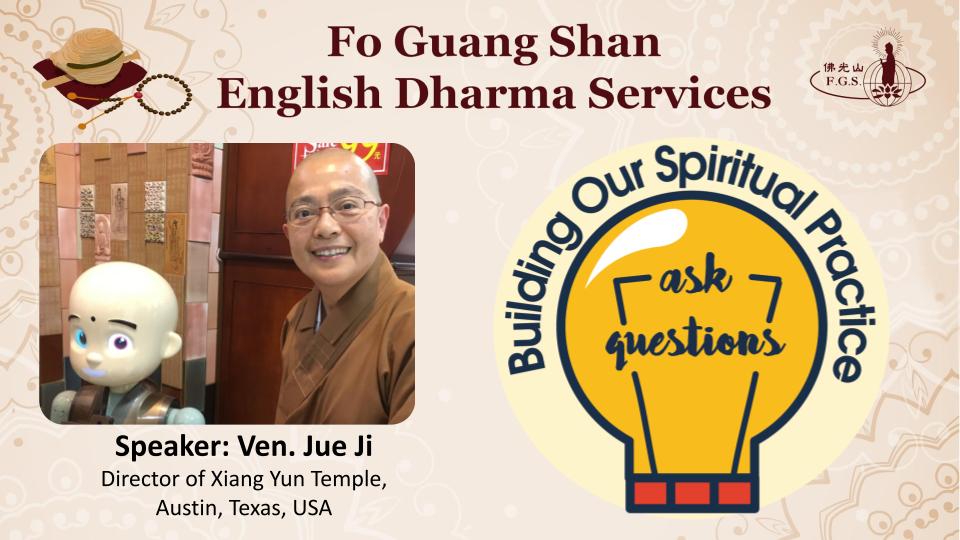
Speaker: Venerable Jue Ji
Director of Xiang Yun Temple, Austin, Texas, U.S.A
I. How to Attain Enlightenment?
“Where do I come from?” This is a big question.
“Where would I go after death?” Another big question!
All religions try to provide answers to these two questions. What is a Buddhist answer to these questions? We need to find the answers ourselves. The Buddha’s teaching serves as a guide to solve the riddle of life. So, when people ask us, “Why do you learn Buddhism?” Automatically, we answer, “To get enlightenment, of course!”
But what is enlightenment? How to get enlightenment? There is neither an immediate nor a concise answer. We need to build up spiritual practice to find the answer. We may start from asking questions. It is believed that small questions lead to small awakenings, major questions lead to major awakenings, while no questions leads to no awakening. So, it is very important that we ask questions to explore the riddle of life. The process of puzzle solving could be the journey to awakening.
There was a famous Chinese poet, Su Dongpo, who lived in the 11th century China. He befriended himself with some Chan Buddhist masters. His understanding about awakening in Buddhism was revealed in his poems. Here are three of his popular poems that demonstrate three phases of awakening.
II. The First Phase of Enlightenment: Before Learning Chan
The poet asked a question, “Why has one failed to see Mount Lu’s real face?”
Mount Lu, is like our Buddha nature. We cannot see the real face of our Buddha nature. Why?
If we pick up any moment in life or anything we experience in life, and we claim that is the real face of life, then we are very ignorant about life. Life changes moment by moment. How can we see the real face of life? For example, I live in Austin, Texas. The sky in Austin is very beautiful. Oftentimes it seems that I could touch the white clouds floating against the blue sky.
But you may not appreciate this as how I look at it. When I look at the sky in Austin, I describe its beauty subjectively. I make the comments that the sky in Austin is very beautiful, which is a general compliment, which can be a partial and superficial compliment, too. If I want to explore the “real face” of the sky in Austin, I would need to take off my subjective viewpoint.
Before awakening, ordinary people see the phenomenal world subjectively, partially, and superficially. We do not learn to see the external world with our Buddha nature inside. Though the Buddha nature is inside us, we are “clouded” by our ignorance. Just like seeing Mount Lu’s range and its peak from far, near, high and low, but still we cannot get a clear picture of Mount Lu. How do we de-cloud the mists that permeate everywhere at Mount Lu?
III. The Second Phase: Before Awakening, After Learning Buddhism
Why are the first line and the last line of the poem are identical? Why “Having finally arrived, everything seemed purposeless”? What do “a thousand resentments” linger in a person feel like, before he/she witnesses “Misty rains of Mount Lu, and tides in Zhejiang” in person?
Having practiced Buddhism for some time, most of us would find that there is not much change in our life. We still need to eat when we are hungry, sleep when it’s time to go to bed, work when the office hours begin, and talk when people greet us, etc. If we are students, we still need to complete our study at school, no matter how many Buddhist sutras we have studied or how many meditation retreats we have completed. If we are parents, we still need to take care of our kids, no matter how many prostrations we have done in front of the alter or how many Buddha’s names we have recited. Life goes on.
Then what is the difference before awakening and after learning Buddhism?
Before we witness “Misty rains of Mount Lu, and tides in Zhejiang” in person, there are all kinds of thoughts, ideas, imagination, and expectation about them. “Resentments” linger in our mind because we want to see the misty rains of Mount Lu and tides in Zhejiang, but we haven’t made it, yet. Therefore, desires arise. When our desires cannot be satisfied, grieves, sorrows, worries, doubts, uncertainties, and pains occupy our mind. All kinds of resentments linger and stay in our mind. It has to wait until we visit Mount Lu in person, bathing in the misty rains there, or go to Zhejiang to witness the spectacular high tides prompted by the merge of river into the ocean, then the resentments would dissolve into the heart of quenching serenity.
Surprisingly enough, the poet wrote, “Having finally arrived, everything seemed purposeless”. We are very curious to ask the poet, why everything seemed “purposeless” after one finally sees the beautiful scenery in person? Everything should have a purpose for its existence. If everything is purposeless, then what is the purpose of visiting the site in person?
It is important to visit the site in person. Only those who have been there are qualified to say that “everything seemed purposeless.” The external scenery remains the same. But those who have visited the site in person have experienced the change inside his mind.
It’s the mind that has changed. The world outside still remains the same. The internal world, the mind, matures after learning and practicing Buddhism. The teaching of Buddhism enables us to see things differently. The subjective perspective has changed to an objective one; the partial viewpoint has come to a holistic one; the superficial sight has changed to a profound vision. The mind learns how to see the phenomenal world as they really are. We still undergo the life process of birth, aging, sickness, and death. But we can take it peacefully without “resentments”. The eight-wind of praise, ridicule, defamation, honor, gain, loss, sorrow, and joy would not sidetrack our faith in the truth. We see life as it is. There is nothing particularly different in the external world. That is why the poet wrote the last line, “Still the misty rains of Mount Lu, still the tides in Zhejiang.”
IV. The Third Phase: After Awakening
After awakening, we will not keep the awakening to ourselves. We want to share the joy of awakening with others. This is what a Bodhisattva practitioner should do. Out of compassion, we are very eager to share the Dharma joy of awakening with others. So, we keep asking the question, “How should such be presented to all?”
“The babbling creeks” are the teaching of the Buddha. “The scenic mountains” are the Dharma teachers. The phenomena that we see in the daytime continue to teach the Dharma at night. Day and night, we merge ourselves in the sea of Dharma. We purify our behavior, speech, and thought day and night. Awakening is definitely not for individual only. To perfect the awakening, we further outreach to the community, the society, the country, and the world.
This is the same question that Sakyamuni Buddha asked himself after he got enlightenment under the Bodhi tree. He observed the faculties of the people that he knew in his surroundings. Then he worked out the formula of the Four Noble Truths, the Noble Eightfold Path, the Law of Dependent Origination, the Law of Cause and Effect, the Law of Karma, etc. The question that the Buddha held to himself had led to the pedagogy that proves to be truthful and applicable in Buddhist history till today.
V. Conclusion
“Where do I come from?” “Where would I go after death?” Prince Siddhartha must have asked these questions hundred and thousand times in his numerous life times before he got the Full Enlightenment. These questions had led him to explore the riddle of life. We are very lucky that we have the auspicious opportunity to learn Buddhism in the 21st century. The Buddha has shown us the approach to find the answers. Let’s keep asking questions, big or small, and finding the solutions based on the Buddha’s guidelines. Ask! Ask! And ask! Small questions lead to small awakenings, no matter how small a question it can be. If possible, ask major questions which would lead to major awakenings. But do not keep silent. No question, no awakening.


